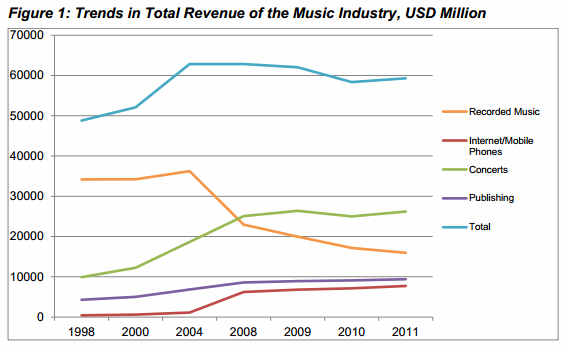 For years we've been hearing that digital piracy of music, film, TV
and even literature has been driving the creative professions into
irrelevance, financial
For years we've been hearing that digital piracy of music, film, TV
and even literature has been driving the creative professions into
irrelevance, financialstarvation and economic death.
There was some evidence to support this contention as the industries affected did what they have historically done when confronted with new technologies: denounced the innovation, fought bitterly against it, grudgingly accepted its inevitability - and then profited wildly from it.
In the digital case, the music and film industries, in particular have continued to rail against illegal downloads, the heedless appropriation of creative content without payment. Apple's freely accessible iTunes system and its copycats have significantly reduced such piracy but it still exists, especially in less economically well-developed regions.
But new research suggests that this assertion may actually be false. Not so much that free entertainment should be the rule, but that stamping out all piracy is an unalloyed social and economic benefit. The data suggest that some piracy actually helps promote interest in the creative content and may be particularly helpful to undiscovered artists. After a period in which the creative industries could not figure out how to profit from the digital revolution, many in those businesses are making more money than they ever have. To those who counter that the number of artists has declined, the response appears to be that this is not specific to the creative arts, but reflective of the larger socio-economic trend towards concentration of wealth and power.
It is also worth noting that these developments, should they be confirmed over time, are consistent with earlier dotcom era theories about the provision of free, unlimited internet access through such services as Linux, CraigsList, Wikipedia and others eventually growing the market for all services, even paid ones. It would appear, in this context, that the freedom to experiment and gain access to knowledge may actually stimulate greater paid demand over time to a degree that dwarfs the short term loss of revenue from piracy. JL
There is ample evidence that file-sharing is helping, rather than hurting the creative industries.
The London School of Economics and Political Science has released a new policy brief urging the UK Government to look beyond the lobbying efforts of the entertainment industry when it comes to future copyright policy.
The scholars call on the Government to look at more objective data when deciding on future copyright enforcement policies.
Over the past years there have been ample research reports showing that file-sharing can have positive effects on the entertainment industries.
Industry lobbyists are often quick to dismiss these findings as incidents or weak research, and counter them with expensive studies they have commissioned themselves.
The London School of Economics and Political Science (LSE) jumps into the discussion this week with a media policy brief urging the UK Government to look beyond the reports lobbyists hand to them. Their report concludes that the entertainment industry isn’t devastated by piracy, and that sharing of culture has several benefits.
“Contrary to the industry claims, the music industry is not in terminal decline, but still holding ground and showing healthy profits. Revenues from digital sales, subscription services, streaming and live performances compensate for the decline in revenues from the sale of CDs or records,” says Bart Cammaerts, LSE Senior Lecturer and one of the report’s authors.
The report shows that the entertainment industries are actually doing quite well. The digital gaming industry is thriving, the publishing sector is stable, and the U.S. film industry is breaking record after record.
“Despite the Motion Picture Association of America’s (MPAA) claim that online piracy is devastating the movie industry, Hollywood achieved record-breaking global box office revenues of $35 billion in 2012, a 6% increase over 2011,” the report reads.
Even the music industry is doing relatively well. Revenue from concerts, publishing and digital sales has increased significantly since the early 2000s and while recorded music revenues show a decline, there is little evidence that piracy is the lead cause.
“The music industry may be stagnating, but the drastic decline in revenues warned of by the lobby associations of record labels is not in evidence,” the report concludes.
The authors further argue that file-sharing can actually benefit the creative industries in various ways.
Music industry revenue
The report mentions the success of the SoundCloud service where artists can share their work for free through Creative Commons licenses, the promotional effect of YouTube where copyrighted songs are shared to promote sales, and the fact that research shows that file-sharers actually spend more money on entertainment than those who don’t share.
“Within the creative industries there is a variety of views on the best way to benefit from online sharing practices, and how to innovate to generate revenue streams in ways that do not fit within the existing copyright enforcement regime,” the authors write.
Finally, the report shows that punitive enforcement strategies such as the three strikes law in France are not as effective as the entertainment industries claim.
The researchers hope that the U.K. Government will review the Digital Economy Act in this light, and make sure that it will take into account the interests of both the public and copyright holders.
This means expanding fair use and private copying exceptions for citizens, while targeting enforcement on businesses rather than individuals.
“We recommend a review of the DEA and related legislation that strikes a healthy balance among the interests of a range of stakeholders including those in the creative industries, Internet Service Providers and internet users.”
“When both [the creative industries and citizens] can exploit the full potential of the internet, this will maximize innovative content creation for the benefit of all stakeholders,” the authors write.




















0 comments:
Post a Comment